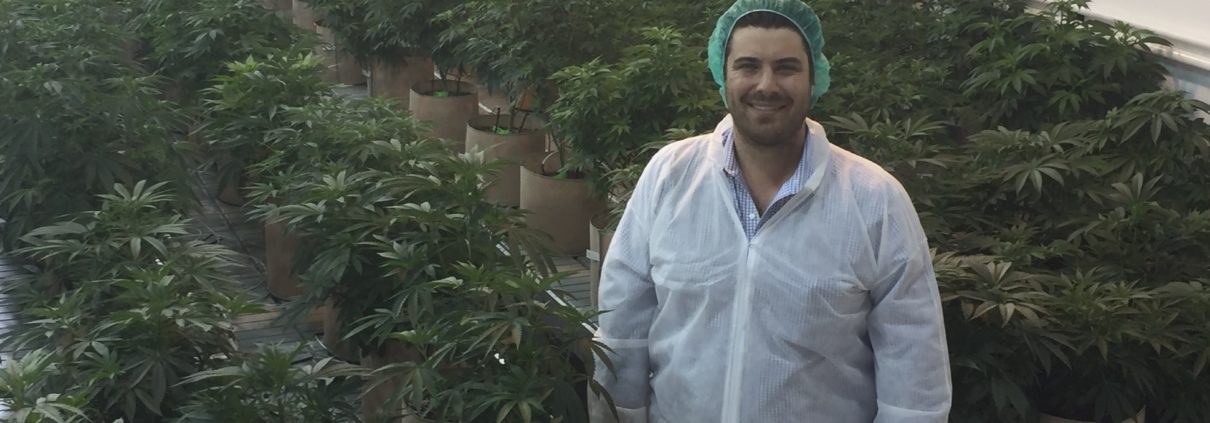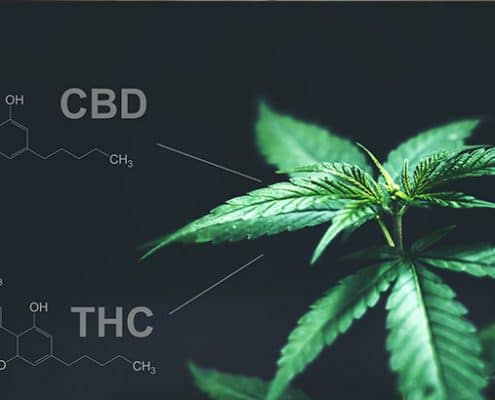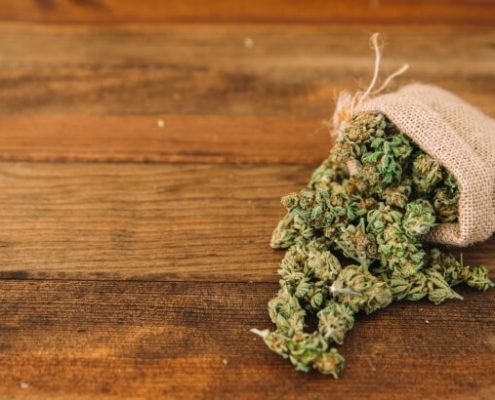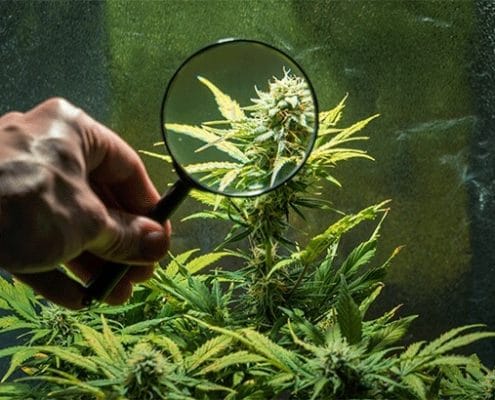Here’s a behind-the-seeds look at a Vegas medical marijuana farm 28 Jul, 2016
Here’s a behind-the-seeds look at a Vegas medical marijuana farm
CEO Armen Yemenidjian tends to Desert Grown Farms’ marijuana plants. | Photo by Corey Levitan for Crain’s Las Vegas
When you tell your Facebook friends you’re touring a medical marijuana cultivation center, many ask if they give out free samples. Or giant bags of Doritos. But Desert Grown Farms, located in a white warehouse in an industrial stretch behind the Las Vegas Strip, is all business. It may as well be a hydroponic tomato farm run by big ag.
“The veg room is on 18 hours of light and six hours of dark,” says CEO Armen Yemenidjian, a passionate 6-foot-5 man with a booming voice. Short for “vegetative phase,” the veg room is the size of a basketball court and filled with perfectly formed marijuana plants where clones are cut from mother plants to root new ones.
Yemenidjian – son of Tropicana owner Alex Yemenidjian and former VP of casino marketing for the hotel-casino – co-owns Desert Grown with newspaper publisher and real estate magnate Brian Greenspun and philanthropist Camille Ruvo. They’re the same trio who operates the Essence dispensaries in town.
A tour of the Argus greenhouse control computer is next. This expensive machine automatically finesses the temperature, humidity and lighting in every room, and sends reverse-osmosis filtered water and a nutrient mixture through pipes streaming through the walls.
Every once in a while, you realize you’re not touring a tomato farm. The security to get in, for example, is reminiscent of the headquarters of Cyberdyne Systems in “Terminator 2.” Almost everywhere, bolted doors can only be entered using keys encoded with your personal information.
Also, disposable booties, scrubs or gowns, gloves, and hairnets must be donned at all times because nothing – not even the dead skin cells you shed – should contaminate the air or the product in an iota of a way.
“Ninety percent of cultivation is environment,” Yemenidjian explains. “We want to make sure we control for all the environmental factors so that multiple harvests yield the same results in testing, such as THC content and terpene profiles.”
The words “marijuana” and “pot” are never used, by the way. It’s always “plants,” “cannabis,” or “medicine.”
“Let’s say someone buys Blue Dream from us,” Yemenidjian says, referring to a hybrid, high-THC strain of marijuana touted for treating pain, depression, and nausea. “We ensure that that Blue Dream is the same Blue Dream every time.”
Other differences between this and just about every other business are less apparent. For instance, marijuana dispensaries can only conduct transactions in cash, adding another layer of complexity and security concern. Most large banks won’t deal with marijuana businesses due to fear of losing their FDIC insurance, or potentially being prosecuted as money-launderers. So they run payroll, cover expenses and pay taxes in cash.
“The government doesn’t have a problem taking our taxes, though,” says Yemenidjian, who will refuse to show you where the cash is kept, even when you ask him nicely.
Nevada has implemented rigorous medical marijuana testing standards. Rather than testing a sample from each batch harvested, every five-pound lot must be tested for THC strength and contaminant levels. (Labs charge up to $900 per tested sample.)
In addition, dispensaries located within Las Vegas city limits are not permitted store signs that advertise to traffic and can’t sell branded clothing. And the amount of shelf space they can devote to paraphernalia is limited.
“The biggest challenge is navigating all the hurdles and loopholes the government puts on,” Yemenidjian says. “It’s a lot of moving targets. And you wake up one day and a rule can be changed or modified. You have to be very nimble and adapt very quickly.”
Business insurance is also rendered uniquely problematic. Insurers will write policies for money lost in a robbery, for instance, or damage to the building in a flood or fire, but not for the value of any plants lost during their lifecycle.
And there’s still just plain old inherent, uninsurable risk. Yemenidjian says he’s not personally worried that federal marshals might bust in at any time. Yet there’s no law guaranteeing that – only a 2011 directive from the U.S. Department of Justice, called the Cole memo, that instructs federal prosecutors to lay off dispensaries and cultivation centers as long as they adhere to a strict set of rules.
And yet this doesn’t harsh anyone’s buzz. When licenses were handed out, applicants for dispensaries included retired Clark County District Court Judge James Bixler, former Las Vegas Assemblyman Chad Christensen and Oscar B. Goodman, the son of former Las Vegas Mayor Oscar Goodman and current Mayor Carolyn Goodman.
“Almost everyone who applied for a cultivation license got approved,” says Leslie Bocskor, founding chairman of the Nevada Cannabis Industry Association and president of the Electrum Partners advisory firm. “Dispensary licenses were harder. There were 500 applicants for 60 that were given away.”
Bocskor says that so many people are rushing into the business because it’s “the right side of history.”
“It’s a very highly profitable industry,” he says. “About 82 percent of the businesses that are started are breaking even or profitable within the first year. But also, as we’ve seen in Colorado, regulating it is breaking the back of the black market, which is good for everybody.”
Medical marijuana has been legal in Nevada since 2000. However, dispensaries haven’t been able to open – at least without being closed soon thereafter – until last August. Now, about a dozen have sprouted up across Las Vegas. They’re the first in the nation allowed to offer reciprocity. In other words, medical marijuana cards issued elsewhere in the country are honored throughout Nevada. Thus, these stores can avail themselves of the 40 million who visit Las Vegas annually, instead of just relying on the 2 million who reside here.
“Reciprocity is the cornerstone of what makes Nevada so ripe for a great marijuana industry,” Bocskor says. “Our legislators realize that millions of people are coming here and that many of these people have a medical need for marijuana, so they should be able to get what they need legally.”
In March, Essence opened the Strip’s first marijuana dispensary – between the SLS Las Vegas and Stratosphere resorts. Until now, it has had to buy its product from other growers.
“This truly takes us to the next level,” says Yemenidjian.
Desert Grown Farms’ first harvest is coming up before August. A few months later, when it’s fully operational, its 54,000 square feet will house 45,000 plants that should yield 12,000 pounds of marijuana per year, which will be sold from $2,000 to $3,500 per pound.
Currently, the center employs only five people, but Yemenidjian expects to hire another 45 more in the next few months.
When you ask Yemenidjian about his hiring requirements, you’re reminded again of the differences between this and every other business.
“We will drug test them,” he replies, “but obviously not for marijuana.”








